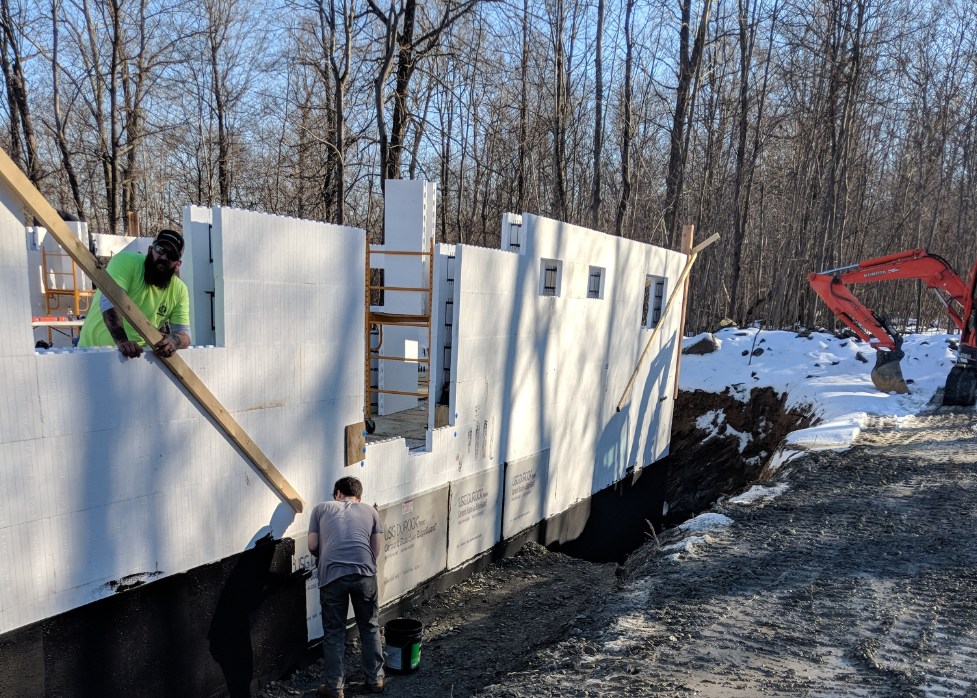
From Efficiency to Durability: The Many Benefits of ICF Construction

When planning a new construction project, you’ve probably come across ICF blocks as a potential building material. Many people are unfamiliar with ICF (Insulated Concrete Forms) and its multitude of benefits. ICF blocks result in buildings that are incredibly strong, energy-efficient, and easy to maintain for decades to come.

What Are ICF Blocks?
ICF blocks consist of two 16" x 48" panels of foam insulation, held together with ties that form a hollow space between the sheets. The blocks connect together and are stacked on top of each other on a job site to form a wall. Once the blocks are in place, rebar is placed in the hollow space between the blocks and concrete is poured over the rebar. Once the concrete sets, the result is a steel-reinforced concrete wall with inner and outer layers of continuous insulation built in.

The Benefits of ICF Construction
Insulated concrete forms (ICFs) bring unique benefits to construction not seen with many other building materials. Here are some of the most notable benefits:
Exceptional Insulation
Insulated concrete forms (ICFs) are one of the best ways to provide thermal insulation for a home. Concrete has a great deal of thermal mass which acts as a thermal battery, meaning it reduces the effects of outdoor temperature fluctuations on the interior environment. The two layers of continuous insulation, one interior and one exterior, also greatly reduce the size of the heating and cooling equipment that a building needs. ICFs provide a high-performance building envelope enabling Net Zero Ready evaluations benefits.
Design Possibilities
ICFs can be used to create curved walls or other shapes that may be easier to build than with traditional construction methods. The ease of working with ICF blocks also means it takes less skilled labor to make various designs.

Acoustic Performance
Another great feature of insulated concrete forms is their acoustic properties. Concrete is an excellent sound absorber and homes built with ICFs tend to be quieter than those constructed with other materials. The foam insulation coupled with the concrete dampens sound as it travels through a room. Exterior sound also has a harder time passing through the thick ICF walls. This feature makes ICF blocks perfect residential or commercial buildings with design requirements for sound proof walls, for peace and quiet.
Fire Resistance
Concrete is naturally fire-resistant, which makes it a great exterior wall material. Concrete also slows down the spread of fire with its exceptional thermal resistance. Walls built from ICF blocks withstand fires for longer than traditional construction methods and are an important component of exceptional fire-resistant construction.
Water Resistance
Insulated concrete forms are also resistant to water and moisture damage. When a waterproof membrane is applied to below grade walls, ICF blocks can even be used as waterproof foundation walls. Unlike other above grade walls of wood or other building materials, the EPS insulation and concrete of an ICF will not rot or deteriorate when exposed to water or moisture.

Disaster-Resistant
Insulated concrete forms also have excellent disaster resilience properties. Concrete is an incredibly strong material, and homes built with ICFs are much more resilient to natural disasters such as hurricanes, earthquakes, and floods, than homes constructed with other materials. The steel-reinforced concrete nature of ICF blocks even makes them a great candidate for use in storm shelters. If you live in an area that is prone to natural disasters, insulated concrete forms may be the perfect construction method for you.
Ease of Use
One of the main advantages of using insulated concrete forms is that they are so easy to assemble. Unlike traditional construction methods, there is no need for skilled labor or special tools to put together an ICF wall. In fact, most people can learn how to do it in just a few minutes. ICF blocks are also lightweight and easy to move around a job site. The attributes of an ICF wall assembly allow for faster close-in timelines enabling faster completion and occupancy.
ICF Blocks: A Better Building Material
With many options on the market for building materials, deciding which one to choose can be difficult. Wood frame construction, structural insulated panels, concrete masonry units, and tilt-up construction all have their pros and cons, but none bring the same mix of features as ICF block construction.
Insulated concrete forms combine ease of use, exceptional strength, and long-lasting durability to make the value proposition for using them hard to beat. ICF blocks are so easy to install that the labor is often lower than in traditional construction projects.
ICF should be at the top of the list for any new building projects. To learn more about the benefits of ICF construction, reach out to the experts at Fox Blocks today!